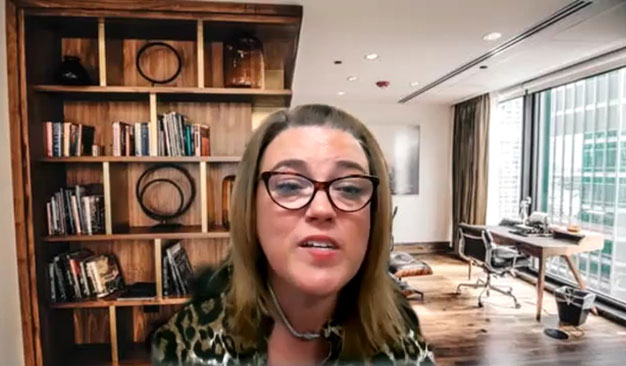
Lisa Nafziger, center director with Community Action of Southeast Iowa, speaks about housing stability during a virtual Lunch and Learn May 6. The diocesan Social Action office hosts the monthly Lunch and Learn series.
By Lindsay Steele
The Catholic Messenger
Housing has an impact on “pretty much every aspect of our lives,” diocesan Social Action volunteer Amy Kersten said during last week’s virtual Lunch and Learn that focused on housing stability during the pandemic. “If you have a challenging day out there in the world, you love to come home.”
The COVID-19 pandemic has caused housing insecurity for both renters and homeowners, she noted. “It’s especially challenging to hear that, right now, so many people are on the brink of losing their homes.”
“When COVID first hit, so many businesses cut back,” said Lisa Nafziger, center director with Community Action of Southeast Iowa and a speaker for the Lunch and Learn on May 6. “Service industries reduced capacity or closed, and many people were laid off. None of the employment benefits came in right away” to help with immediate expenses such as rent and utilities.
She said her organization, which connects residents of Louisa, Des Moines, Henry and North Lee counties with state, federal and local assistance, said housing has long been a major concern for clients. “Some of our biggest work includes helping with rent and utilities. We also have food pantries.” Each year, the agency sends out surveys to clients to identify their needs. “Housing was always in the top five, even before COVID. About 40 percent say housing is an issue.”
Nafziger said a new Iowa Finance Authority program is promising. Individuals affected by COVID-19 can apply for up to 12 months of rent and utility assistance. “It’s more than an agency like ours could spend on anyone,” she said. The program will help struggling renters and landlords. However, she noted a bottleneck of applications.
While many people who are not homeless can access aid through state and federal programs, “the state doesn’t always make it easy for us to use dollars on homelessness because of the categories into which people fall.” For example, the state does not consider “couch surfers” homeless. “I understand we can’t help (everyone), but for me, a family couch surfing is homeless.” The agency is working with legislators to try to resolve that issue. Families with mixed immigration status also tend to fall between the cracks.
Local donations are a big help to families and individuals ineligible for state and federal aid. Nafziger identified a group of churches in the Keokuk area that work together to raise funds and identify local needs. They partner with Community Action of Southeast Iowa to distribute those funds. Kent Ferris, diocesan director of Social Action, lauded the cooperation.
The second speaker, Linda Molyneaux, is a retired lawyer and 40-year member of St. Paul the Apostle Parish in Davenport who has experience with evictions as a magistrate judge signing eviction court orders and as an attorney defending persons being evicted.
More recently, she has been active in Silos to Solutions, a long-term vision of the Quad Cities Housing Cluster to address affordable housing needs. Her work focuses on prevention initiatives; reducing evictions is a big part of that. “Scott County has one of the highest rates of eviction in the U.S.,” she said.
During her legal career, she became aware of the impact of “unworkable” state laws on evictions for struggling renters. She gave an example: the renter receives an eviction notice on a Friday and has three days to come up with the money. If that doesn’t happen, the renter has one week to move out.
“It’s a totally unmanageable, destabilizing and horrific experience,” Molyneaux said. “Most people are not able to come up with the money in a three-day period. Some clients were sick, couldn’t work and didn’t have sick leave; others had their hours cut. It could be something short term, but when the notice came they weren’t able to pay within three days.”
While eviction moratoriums during the COVID-19 pandemic have been “lifesavers,” court hearings still take place, she said. “Landlords are pushing back. Even with (moratoriums) in place, it doesn’t mean there is a guarantee of housing stability.”
Prior evictions can make it difficult for someone to rent in the future, as landlords have access to the records. The reason for the eviction doesn’t matter — whether a domestic abuse victim’s abuser has stolen rent money or the renter chooses not to pay. “Iowa doesn’t have a system to expunge evictions, but I wish we did.”
Changing the three-day deadline is a goal for Molyneaux. She is interested in pursuing a program similar to one Polk County started last year to reduce evictions. Since September, Iowa Legal Aid staff and Polk County Housing Trust Fund officials have been assisting renters who show up at the Polk County Courthouse for eviction hearings. The officials can analyze tenants’ cases and help connect them with financial resources to avoid eviction. Such a program could benefit people in Scott County, she believes. “The key thing is that someone there has a checkbook and is able to pay right then. They have money right away to settle.”
Deacon Steve Barton, who serves Holy Family Parish in Davenport, also spoke at the Lunch and Learn. He is with Habitat for Humanity and is a member of the Quad Cities Housing Cluster. His major goal is to move people from poverty – especially generational poverty – into homeownership. A home’s value “can be passed down. … Habitat is helping people to have that first home ownership, and helping people stay in their homes.”
Assistance for veterans at risk for homelessness
DAVENPORT — Humility Homes and Services, Inc. (HHSI) recently received CARES Act funds to expand its Supportive Services for Veteran Families program.
HHSI established the Supportive Services for Veteran Families (SSVF) in 2011 to rapidly re-house homeless veteran families and prevent homelessness for those at imminent risk due to a housing crisis. SSVF provides financial assistance and supportive services. During the first year of the COVID-19 pandemic, HHSI served 218 veterans.
With the Center for Disease Control and Prevention eviction moratorium set to expire on July 1, HHSI anticipates more families will be in need of assistance. “The pandemic has exacerbated the housing crisis in all of our communities. We want to help as many veterans as possible remain in their homes,” said Christie Adamson, HHSI’s assistant director. Veterans and their families are eligible if they live in Scott, Clinton, Jackson or Muscatine counties in Iowa, or Rock Island, Henry, Lee, Mercer and Whiteside Counties in Illinois.
Eligible veteran families can receive case management and assistance in obtaining VA and other mainstream benefits that promote housing stability and community integration. Veterans and families in need of assistance should contact Blair Brown, HHSI’s SSVF program supervisor, at (563) 217-1657 or at b.brown@humilityhomes.org for more information.











